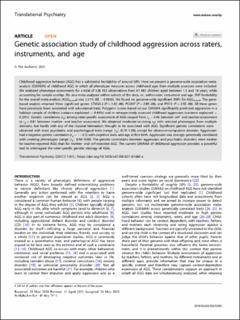| dc.contributor.author | Ip, Hill F. | |
| dc.contributor.author | van der Laan, Camiel M. | |
| dc.contributor.author | Krapohl, Eva M. L. | |
| dc.contributor.author | Brikell, Isabell | |
| dc.contributor.author | Sánchez-Mora, Cristina | |
| dc.contributor.author | Nolte, Ilja M. | |
| dc.contributor.author | Pourcain, Beate St | |
| dc.contributor.author | Bolhuis, Koen | |
| dc.contributor.author | Palviainen, Teemu | |
| dc.contributor.author | Zafarmand, Hadi | |
| dc.contributor.author | Colodro-Conde, Lucía | |
| dc.contributor.author | Gordon, Scott | |
| dc.contributor.author | Zayats, Tetyana | |
| dc.contributor.author | Aliev, Fazil | |
| dc.contributor.author | Jiang, Chang | |
| dc.contributor.author | Wang, Carol A. | |
| dc.contributor.author | Saunders, Gretchen | |
| dc.contributor.author | Karhunen, Ville | |
| dc.contributor.author | Hammerschlag, Anke R. | |
| dc.contributor.author | Adkins, Daniel E. | |
| dc.contributor.author | Border, Richard | |
| dc.contributor.author | Peterson, Roseann E. | |
| dc.contributor.author | Prinz, Joseph A. | |
| dc.contributor.author | Thiering, Elisabeth | |
| dc.contributor.author | Seppälä, Iikka | |
| dc.contributor.author | Vilor-Tejedor, Natàlia | |
| dc.contributor.author | Ahluwalia, Tarunveer S. | |
| dc.contributor.author | Day, Felix R. | |
| dc.contributor.author | Hottenga, Jouke-Jan | |
| dc.contributor.author | Allegrini, Andrea G. | |
| dc.contributor.author | Rimfeld, Kaili | |
| dc.contributor.author | Chen, Qi | |
| dc.contributor.author | Yi, Lu | |
| dc.contributor.author | Martin, Joanna | |
| dc.contributor.author | Soler Artigas, Marìa | |
| dc.contributor.author | Rovira, Paula | |
| dc.contributor.author | Bosch, Rosa | |
| dc.contributor.author | Español, Gemma | |
| dc.contributor.author | Ramos-Quiroga, Josep Antonio | |
| dc.contributor.author | Neumann, Alexander | |
| dc.contributor.author | Haavik, Jan | |
| dc.contributor.author | Harris, Jennifer Ruth | |
| dc.contributor.author | Helgeland, Øyvind | |
| dc.contributor.author | Johansson, Stefan | |
| dc.contributor.author | Knudsen, Gun Peggy Strømstad | |
| dc.contributor.author | Njølstad, Pål Rasmus | |
| dc.contributor.author | Havdahl, Alexandra | |
| dc.contributor.author | Magnus, Per Minor | |
| dc.contributor.author | Reichborn-Kjennerud, Ted | |
| dc.contributor.author | Boomsma, Dorret I. | |
| dc.date.accessioned | 2021-11-29T07:40:57Z | |
| dc.date.available | 2021-11-29T07:40:57Z | |
| dc.date.created | 2021-11-04T10:16:21Z | |
| dc.date.issued | 2021 | |
| dc.identifier.issn | 2158-3188 | |
| dc.identifier.uri | https://hdl.handle.net/11250/2831787 | |
| dc.description.abstract | Childhood aggressive behavior (AGG) has a substantial heritability of around 50%. Here we present a genome-wide association meta-analysis (GWAMA) of childhood AGG, in which all phenotype measures across childhood ages from multiple assessors were included. We analyzed phenotype assessments for a total of 328 935 observations from 87 485 children aged between 1.5 and 18 years, while accounting for sample overlap. We also meta-analyzed within subsets of the data, i.e., within rater, instrument and age. SNP-heritability for the overall meta-analysis (AGGoverall) was 3.31% (SE = 0.0038). We found no genome-wide significant SNPs for AGGoverall. The gene-based analysis returned three significant genes: ST3GAL3 (P = 1.6E–06), PCDH7 (P = 2.0E–06), and IPO13 (P = 2.5E–06). All three genes have previously been associated with educational traits. Polygenic scores based on our GWAMA significantly predicted aggression in a holdout sample of children (variance explained = 0.44%) and in retrospectively assessed childhood aggression (variance explained = 0.20%). Genetic correlations (rg) among rater-specific assessment of AGG ranged from rg = 0.46 between self- and teacher-assessment to rg = 0.81 between mother- and teacher-assessment. We obtained moderate-to-strong rgs with selected phenotypes from multiple domains, but hardly with any of the classical biomarkers thought to be associated with AGG. Significant genetic correlations were observed with most psychiatric and psychological traits (range |rg|: 0.19–1.00), except for obsessive-compulsive disorder. Aggression had a negative genetic correlation (rg = ~−0.5) with cognitive traits and age at first birth. Aggression was strongly genetically correlated with smoking phenotypes (range |rg|: 0.46–0.60). The genetic correlations between aggression and psychiatric disorders were weaker for teacher-reported AGG than for mother- and self-reported AGG. The current GWAMA of childhood aggression provides a powerful tool to interrogate the rater-specific genetic etiology of AGG. | en_US |
| dc.language.iso | eng | en_US |
| dc.publisher | Springer Nature | en_US |
| dc.rights | Navngivelse 4.0 Internasjonal | * |
| dc.rights.uri | http://creativecommons.org/licenses/by/4.0/deed.no | * |
| dc.title | Genetic association study of childhood aggression across raters, instruments, and age | en_US |
| dc.type | Journal article | en_US |
| dc.type | Peer reviewed | en_US |
| dc.description.version | publishedVersion | en_US |
| dc.rights.holder | Copyright The Author(s) 2021 | en_US |
| dc.source.articlenumber | 413 | en_US |
| cristin.ispublished | true | |
| cristin.fulltext | original | |
| cristin.qualitycode | 1 | |
| dc.identifier.doi | 10.1038/s41398-021-01480-x | |
| dc.identifier.cristin | 1951310 | |
| dc.source.journal | Translational Psychiatry | en_US |
| dc.identifier.citation | Translational Psychiatry. 2021, 11, 413. | en_US |
| dc.source.volume | 11 | en_US |

